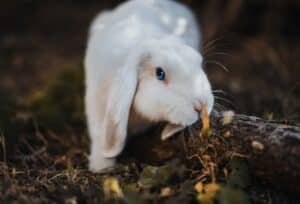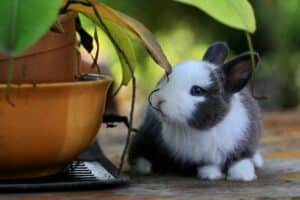How often should rabbits eat? Ensuring your rabbit’s diet is balanced and meets their daily needs is essential for their health. In this article, we’ll explain how often to feed your rabbit, what foods are important, and how to establish a feeding routine. From unlimited hay to daily fresh vegetables and measured pellets, we’ll guide you through everything you need to know for a healthy rabbit diet.
Key Takeaways
- A rabbit’s diet should primarily be hay (80-90%), supplemented with fresh vegetables and limited high-fiber pellets to ensure proper digestion and dental health.
- Consistency in feeding routines is essential; rabbits should have unlimited access to hay, daily fresh vegetables, and pellets served twice a day to promote natural eating behaviors.
- Monitoring a rabbit’s eating habits is crucial for health, as changes can signal potential health issues; consult a veterinarian if any eating problems arise.
Understanding a Rabbit’s Diet
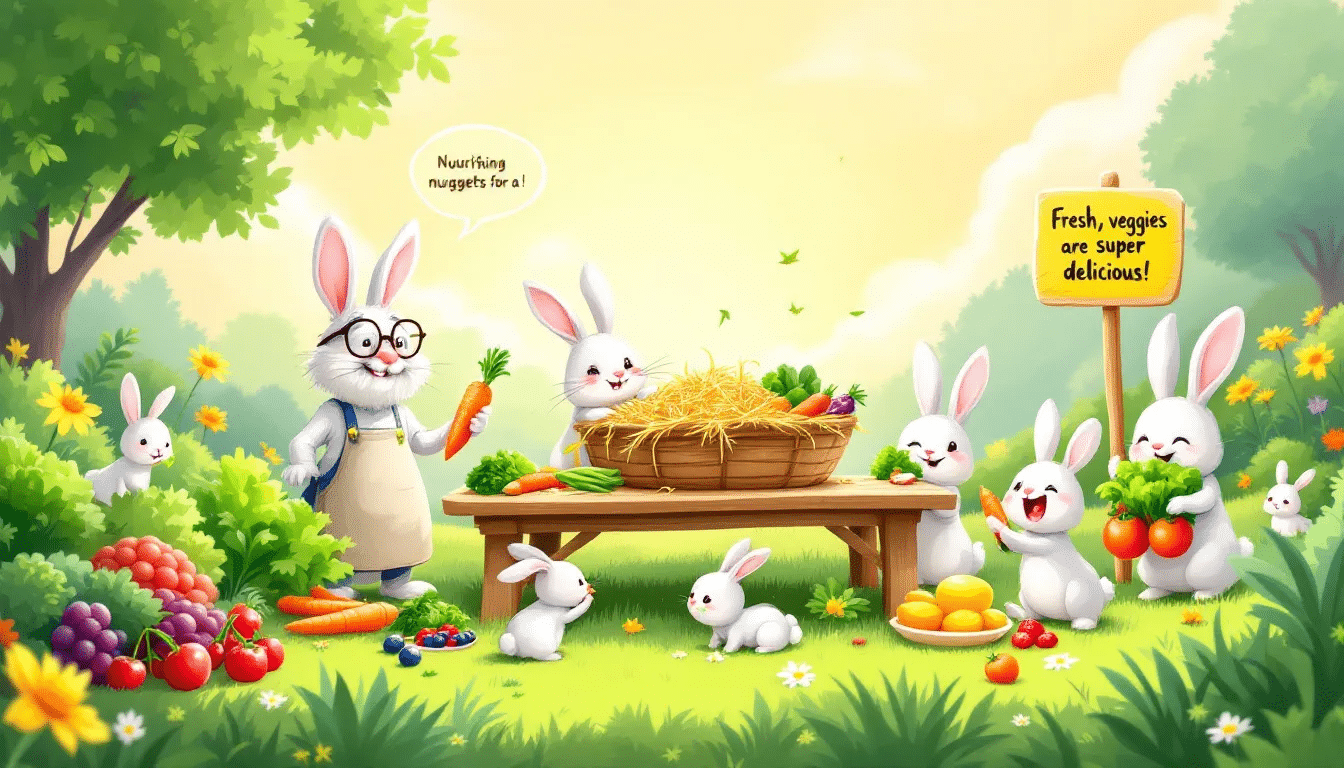
A proper rabbit’s diet forms the cornerstone of a rabbit’s health. Being herbivores, rabbits thrive on a diet primarily composed of hay, fresh vegetables, and a few pellets. Hay and grass should constitute about 80-90% of their diet, promoting good digestion and dental health.
Fresh vegetables offer essential nutrients and variety, while pellets should be limited but high in fiber. Providing these components in the right proportions helps maintain a rabbit’s overall health and well-being.
Mostly Hay and Grass
Hay and grass are the cornerstones of a rabbit’s diet. Feeding your rabbit mostly hay ensures that their teeth, which grow continuously, are worn down properly. This prevents dental diseases that can be painful and severe. Timothy hay, orchard grass, brome, and oat hay are excellent choices for adult rabbits, providing the necessary fiber for healthy digestion. Always ensure the hay is fresh, sweet-smelling, and free from grit, dust, and mold. For young rabbits, alfalfa hay is recommended because of its higher protein content, which supports growth.
Distinguishing between feeding hay and bedding hay is crucial. Feeding hay is fresher and more nutritious, while bedding hay is typically drier and less suitable for eating. Unlimited hay supports your rabbit’s digestive system and helps prevent serious dental issues. Ensure your rabbit’s diet includes sufficient hay to meet these needs.
Fresh Vegetables and Leafy Greens
Fresh vegetables and leafy greens are essential for a balanced diet, providing nutrients that fresh green vegetables and fresh veg alone cannot offer.
Safe vegetables for daily feeding include:
- bell peppers
- bok choy
- Brussels sprouts
- cucumber
Introduce new vegetables gradually to avoid digestive issues and observe your rabbit’s reaction to ensure tolerance. A general guideline is to provide about one cup of fresh vegetables per two kilograms of body weight daily.
Leafy greens, such as romaine lettuce and dandelion greens, should be a staple in your rabbit’s diet for their high nutritional value. Remember to wash all vegetables thoroughly to remove pesticides and contaminants. Fresh greens not only contribute to a healthy diet but also add variety, which many rabbits love.
Limited Pellets
While hay and fresh vegetables form the bulk of a rabbit’s diet, pellets also play a crucial role. However, they should only make up about 5% of the total food intake. High-fiber pellets are essential, but overfeeding can lead to obesity and health problems. The recommended amount is about 1/4 cup per day for an average-sized adult rabbit.
Measure pellets according to your rabbit’s weight to avoid overfeeding and keep portions controlled.
How Often Should You Feed Your Rabbit?
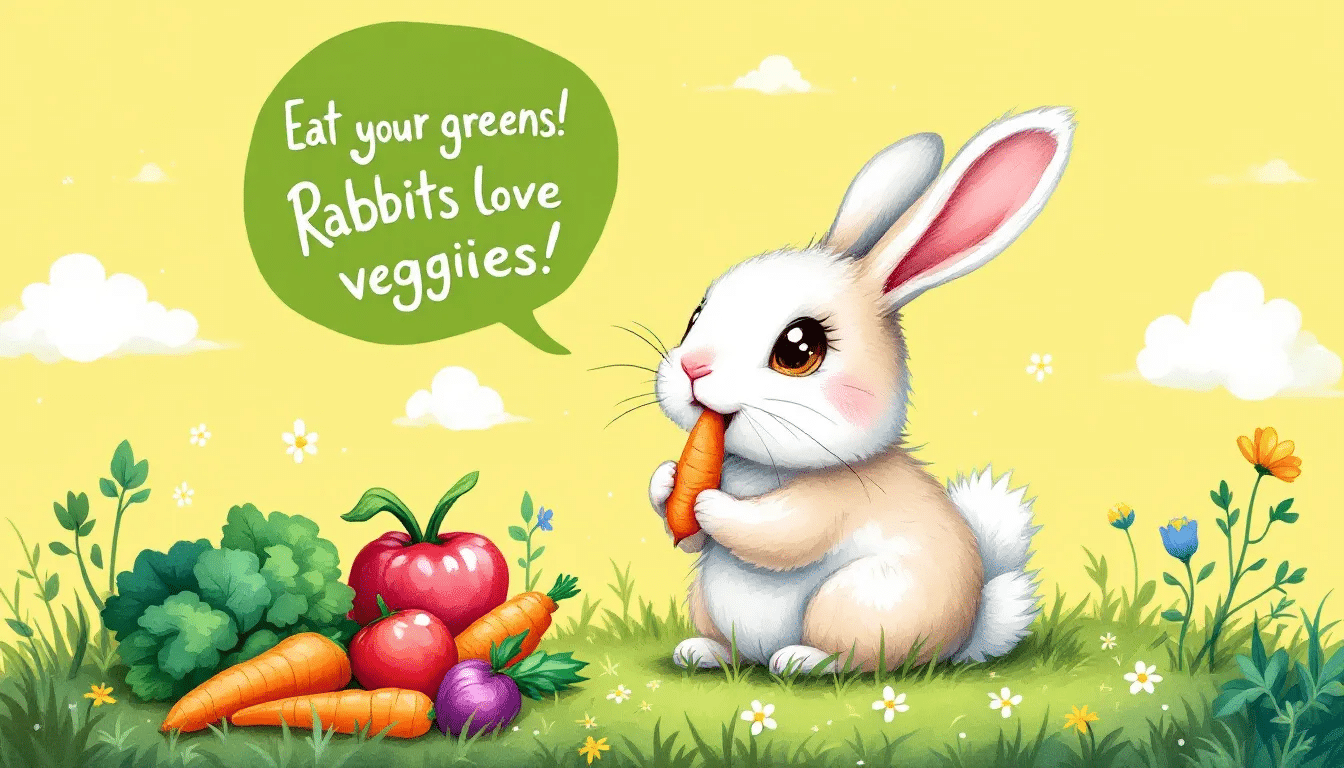
Feeding your rabbit consistently and ensuring they have constant access to food is crucial for maintaining their health. A daily feeding routine helps meet their nutritional needs and supports natural eating patterns. Serve fresh vegetables and pellets in divided meals, usually twice a day, to promote optimal health.
Observing your rabbit’s eating habits regularly can help you adjust their diet as needed and ensure they are thriving.
Unlimited Hay Supply
An unlimited supply of hay is crucial for your rabbit’s digestive health. Hay should always be available to support digestion and dental health. Ensure the hay is of good quality and free from contaminants.
Offering one bundle of fresh hay daily ensures your rabbit’s dietary needs are met.
Daily Fresh Vegetables
Fresh vegetables should be included in your rabbit’s daily diet. Serving about one cup of fresh vegetables per two pounds of body weight ensures they receive the necessary nutrients.
Leafy greens, rich in nutrients, should be part of their daily servings. Wash all vegetables thoroughly before feeding them to your rabbit.
Twice-Daily Pellets
Feed rabbits pellets twice a day in measured amounts. This maintains a healthy diet and prevents overfeeding. Scattering the pellets around their home can encourage natural foraging behavior, promoting mental stimulation and physical activity.
Ensure the pellets are high in fiber and suited to your rabbit’s nutritional needs.
Importance of Fresh Water
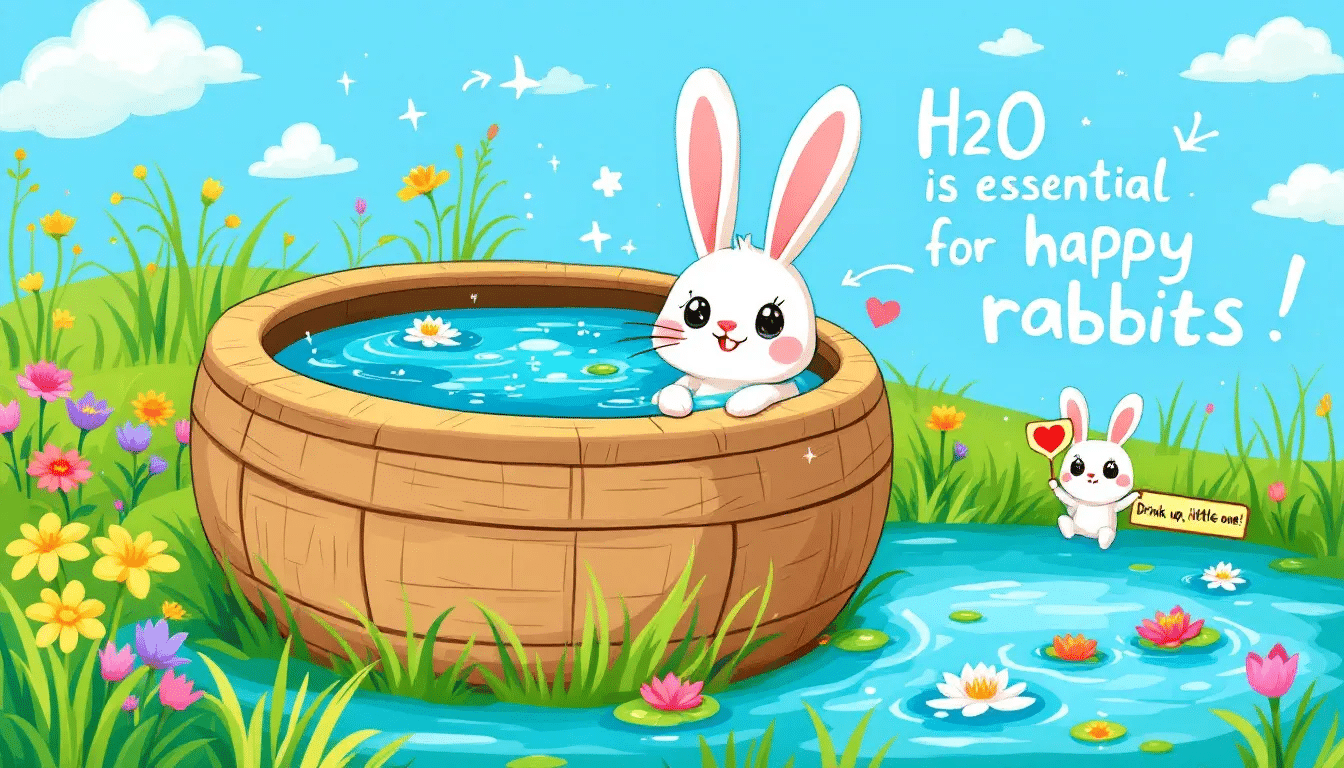
Fresh water is as essential as food in a rabbit’s diet. Constant access to fresh water prevents dehydration and serious health issues. Ensure water is available 24/7, whether through water bowls or sipper bottles.
Regularly check and clean water containers to avoid contamination and ensure hydration.
Water Bowls vs. Bottles
Water bowls and bottles each have their pros and cons. Many rabbits prefer drinking from a water bowl, and heavy ceramic bowls are ideal as they are less likely to tip over. However, bowls must be monitored to avoid spills and contamination.
Sipper bottles require regular cleaning to prevent bacterial growth and should be checked daily to ensure they aren’t clogged.
Daily Water Changes
Changing your rabbit’s water daily prevents contamination and encourages drinking. Fresh water supports hydration and overall health, reducing the risk of dehydration and urinary tract infections.
Establishing a routine for water changes ensures constant access to clean, fresh water.
Treats and Occasional Foods
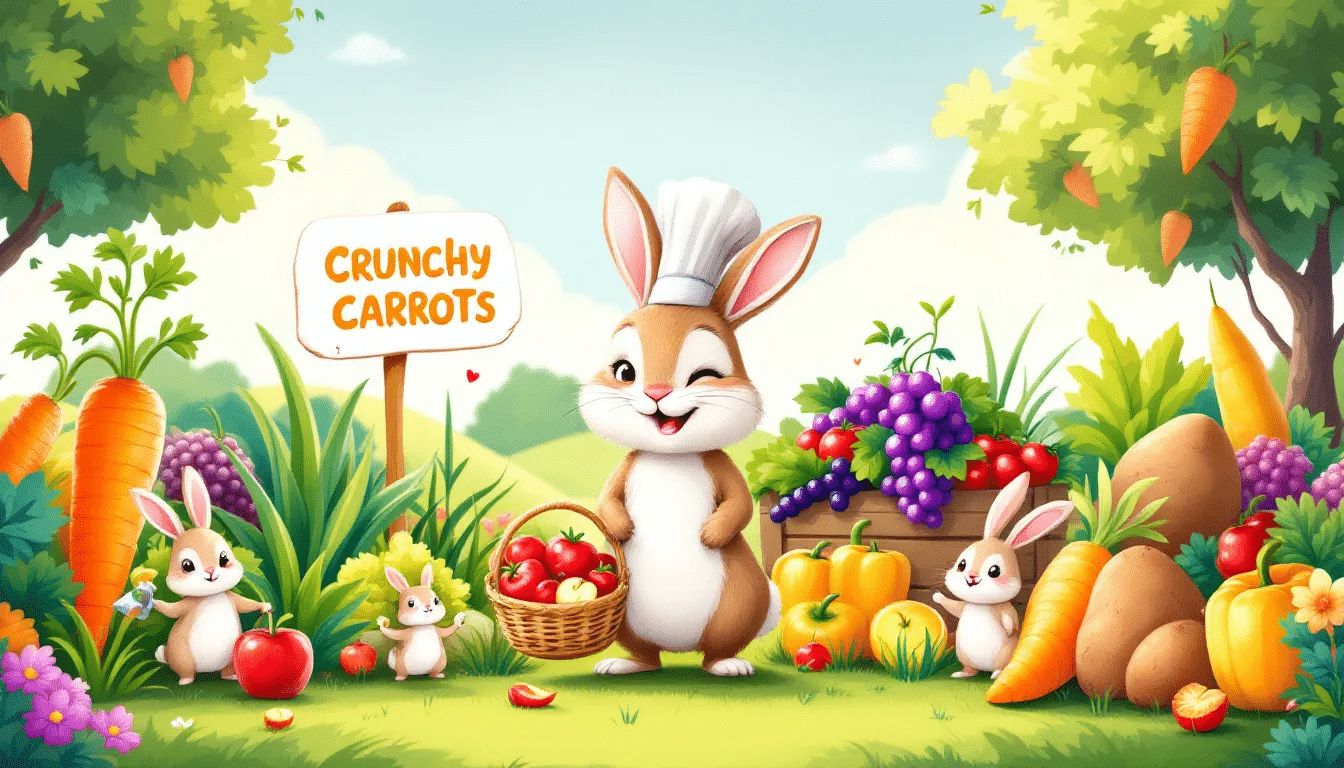
Treats can be a delightful addition to your rabbit’s diet, but moderation is key. Offering vegetables as rabbit treats once or twice a week adds healthy variety. Root vegetables and fruits can also be given occasionally in small amounts, while muesli-style foods and sugary treats should be avoided to prevent health issues.
Treats should be free of added sugars, preservatives, and artificial coloring.
Healthy Treat Options
Safe treats for rabbits include dandelion greens, carrot tops, fresh coriander, broccoli, and mango. Offer these sparingly and in small quantities to prevent digestive issues. Fruits like carrots can be given as treats but should be limited to 1-2 tablespoons once or twice a week.
Ensure treats are fresh and free from harmful additives.
Avoiding Sugary Treats
Avoid sugary treats to maintain your rabbit’s health. Frequent consumption of sugary treats can lead to obesity and dental disease. Giving treats sparingly and in very limited amounts helps keep your rabbit healthy and their teeth in good condition.
Monitoring Your Rabbit’s Eating Habits
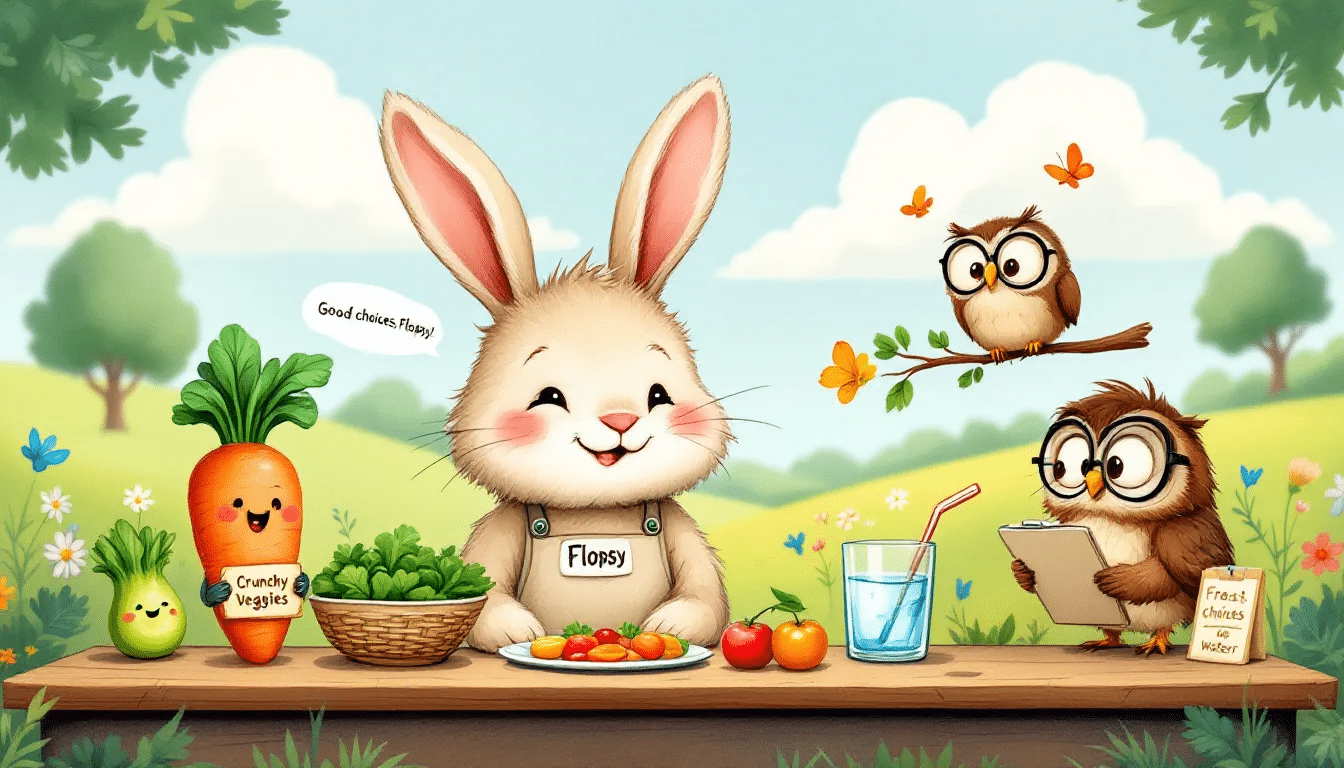
Monitoring your rabbit’s eating habits is crucial for their health. Regular observation of their diet and behavior can help identify potential issues early. Adjust feeding practices based on their age, health, and lifestyle to meet their nutritional needs.
Monitor their weight and eating patterns to ensure they are consuming a balanced diet.
Signs of Proper Eating
Proper eating habits in rabbits are indicated by the production of two types of droppings: hard, dry waste pellets and soft, moist caecotropes. Cecotropes are rich in protein and vitamins B and K, essential for rabbit health.
Regular weight checks and monitoring droppings can help ensure your rabbit is eating the right food and maintaining a healthy weight. Sticky droppings may indicate dietary issues, so keep an eye on their overall health.
Addressing Eating Issues
Never ignore changes in eating behavior, as they can signal serious health risks like gut stasis. If your rabbit stops eating or shows unusual eating patterns, seek immediate veterinary consultation. Diarrhea or soft feces also warrants a vet visit to address potential health problems.
Promptly ensuring your rabbit resumes eating is vital for their well-being.
Special Considerations for Different Rabbits
Rabbits have unique dietary needs based on their age, health, and lifestyle. Growing, pregnant, nursing or underweight rabbits may require larger portions of rabbit pellets to meet their enhanced nutritional needs.
Tailor their diet to ensure they receive the appropriate nutrients for their specific conditions.
Young Rabbits
Young rabbits have specific dietary needs that require careful consideration. Alfalfa hay, with its high protein content, is essential for young rabbits, supporting growth and development.
As they grow, gradually introduce fresh vegetables to ensure a balanced diet that supports their health.
Adult Rabbits
Adult rabbits should primarily consume hay, with limited pellets to maintain a healthy weight. Grass hay, such as Timothy hay, is ideal for adult rabbits, providing the necessary fiber for digestion.
Limiting pellet intake helps prevent obesity and supports overall health.
Older or Sick Rabbits
Older or sick rabbits often require specialized diets that should be carefully monitored and adjusted based on veterinary guidance. Consulting a veterinarian for personalized dietary advice ensures these rabbits receive the appropriate nutrients for their condition.
Adjusting food portions and types can help manage their health more effectively.
Summary
In summary, feeding your rabbit a balanced diet rich in hay, fresh vegetables, and limited pellets is crucial for their health and well-being. Providing constant access to fresh water, monitoring their eating habits, and offering healthy treats in moderation are essential practices. Tailoring their diet to their age and health needs ensures they receive the proper nutrients. By following these guidelines, you can ensure your rabbit leads a happy and healthy life.
Frequently Asked Questions
How much hay should I provide my rabbit daily?
To promote optimal health, provide your rabbit with unlimited access to fresh, high-quality hay daily, as it should constitute 80-90% of their diet. This dietary approach supports their digestive health and dental care effectively.
Can I feed my rabbit fruits and vegetables every day?
You can provide your rabbit with fresh vegetables daily, approximately one cup per two kilograms of body weight. However, fruits should be offered only as occasional treats, limited to 1-2 tablespoons per 5 pounds of body weight once or twice a week.
How often should I change my rabbit’s water?
You should change your rabbit’s water daily to prevent contamination and ensure access to fresh, clean water consistently.
Are pellets necessary for a rabbit’s diet?
Pellets are necessary for a rabbit’s diet but should only comprise about 5%, primarily as high-fiber options. Overfeeding can lead to obesity and health issues, so moderation is key.
What should I do if my rabbit stops eating?
If your rabbit stops eating, you must seek immediate veterinary attention, as this can signal serious health issues such as gut stasis. Prompt action is essential to ensure your rabbit’s well-being.

